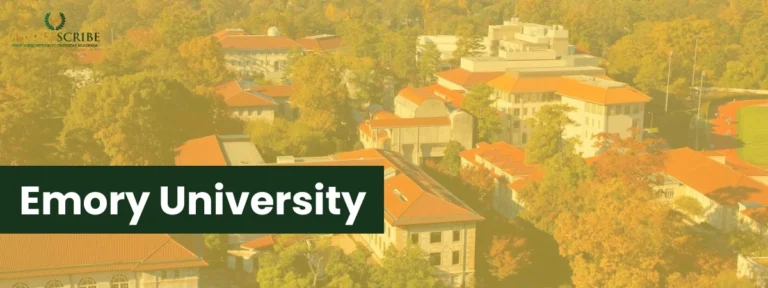The University of Freiburg, officially known as Albert-Ludwigs-Universität Freiburg, is a prestigious public research university located in Freiburg im Breisgau, Germany. Established in 1457, it stands as one of Germany’s oldest and most esteemed institutions. Renowned for its academic excellence and innovation, the university offers a diverse range of programs across various disciplines. With a strong emphasis on research and interdisciplinary studies, it attracts students from around the globe seeking quality education in a vibrant and culturally rich environment.
University of Freiburg – Overview
| Feature | Details |
| Official Name | Albert-Ludwigs-Universität Freiburg |
| Founded | 1457 (Over 560 years of academic excellence) |
| Type | Public Research University |
| Location | Freiburg im Breisgau, Baden-Württemberg, Germany |
| World Ranking | #192 (QS World University Rankings 2025) |
| No. of Students | Over 24,000 students, including 4,000+ international students |
| Languages of Instruction | German & English (especially for Master’s and PhD programs) |
| Popular Fields of Study | Medicine, Engineering, Natural Sciences, Humanities, Social Sciences |
| Tuition Fees | €0 for most programs (except €1,500/semester for non-EU students) |
Historical Background and Reputation
The University of Freiburg was established by Archduke Albert VI of Austria in 1457, initially serving as a center for Catholic education. Over the centuries, it has evolved into a comprehensive research university that embraces all fields of knowledge while maintaining its commitment to academic excellence and intellectual freedom. The university played a significant role during the Reformation, the Enlightenment, and various political transformations in German history.
Today, the University of Freiburg is home to approximately 25,000 students, including over 3,000 international students from more than 120 countries. The university employs around 5,000 academic staff members, including over 430 professors, creating an impressive student-to-faculty ratio that ensures personalized attention and high-quality education.
University of Freiburg Acceptance Rate

The University of Freiburg maintains a competitive admissions process, reflecting its high academic standards. The overall acceptance rate stands at approximately 33%, indicating a selective yet accessible institution for qualified applicants.
Acceptance Rate Overview
| Program Level | Acceptance Rate |
| Undergraduate | 35% |
| Master’s Programs | 33% |
Competitive Programs with Lower Acceptance Rates at the University of Freiburg

Acceptance rates are approximate and can vary based on the applicant pool and specific admission criteria.
| Program | Estimated Acceptance Rate |
| Medicine | 5% |
| Chemical Biotechnology | 20–30% |
| Data Science | 20–30% |
| Management | 20% |
| Engineering Programs | 30–40% |
Suggested Post: Technical University of Munich Acceptance Rate
Undergraduate Acceptance Rate at the University of Freiburg
The University of Freiburg is moderately selective when it comes to undergraduate admissions, particularly for international students. As a public university in Germany, it primarily serves German and EU students, but it also welcomes qualified applicants from all over the world.
Estimated Undergraduate Acceptance Rate
| Applicant Type | Estimated Acceptance Rate |
| Domestic (Germany/EU) | 35% |
| International Applicants | 25–30% |
Top Competitive Undergraduate Programs
Certain undergraduate programs at the University of Freiburg are particularly competitive due to limited enrollment capacity and high demand.
| Program | Language of Instruction | Estimated Acceptance Rate |
| Medicine | German | 5% |
| Denistry | German | 6–8% |
| Law | German | 20% |
| Psychology | German | 25% |
| Molecular Medicine | German | 15% |
Suggested Post: Technical University Berlin Acceptance Rate
Master’s Acceptance Rate at the University of Freiburg
Master’s programs at the University of Freiburg are known for their rigorous admission criteria and strong academic reputation. Admission generally depends on the applicant’s prior academic performance, relevant subject background, and, in some cases, work or research experience.
Estimated Master’s Acceptance Rate
| Applicant Type | Estimated Acceptance Rate |
| Domestic (Germany/EU) | 40–45% |
| International Applicants | 30–35% |
Top Competitive Master’s Programs

Below are some of the most selective and sought-after master’s programs at the University of Freiburg, particularly among international students:
| Program | Language of Instruction | Estimated Acceptance Rate |
| MSc in Computer Science | English | 25% |
| MSc in Data Science | English | 20–30% |
| MSc in Environmental Sciences | English | 30% |
| MSc in Biomedical Sciences | English | 25–30% |
| MBA Program | English | 20% |
Top Bachelor’s Programs at the University of Freiburg

Below is a curated list of University of Freiburg’s most popular undergraduate programs, each designed to provide a strong academic foundation and research-based learning in both traditional and modern disciplines.
| Program Name | Field | Features |
| B.Sc. Biology | Natural Sciences | Known for combining fieldwork and laboratory research; strong focus on molecular biology and ecology; collaboration with research institutes offers hands-on experience. |
| B.Sc. Computer Science (Informatik) | Engineering & IT | Strong foundation in programming and systems; access to state-of-the-art labs and connection with local tech industries; high graduate employability. |
| B.Sc. Molecular Medicine | Biomedical Sciences | Bridges biology and medicine, preparing students for research in medical science and biomedical fields; close links with Freiburg University Hospital. |
| State Exam in Medicine | Health Sciences | One of Germany’s oldest medical faculties; intensive clinical training at University Hospital; very selective admission ensuring quality education. |
| B.A. Political Science | Social Sciences | Covers global politics, governance, and policy analysis; well-respected faculty and active research groups contribute to its strong academic profile. |
| B.A. Law (First State Exam) | Legal Studies | Traditional and rigorous legal education; essential for practicing law in Germany; combines theory with practical training through internships. |
| B.Sc. Environmental Sciences | Environmental Studies | Interdisciplinary approach combining natural sciences and sustainability studies; addresses urgent global environmental challenges. |
| B.Sc. Psychology | Social Sciences | Curriculum includes cognitive, clinical, and social psychology; active participation in research projects from early stages. |
Top Master’s Programs at University of Freiburg

University of Freiburg’s master’s programs are internationally recognized for their specialization, research opportunities, and strong links to industry and public sectors. Many master’s degrees are offered in English, attracting students worldwide.
| Master’s Program | Why It’s a Top Program |
| Computer Science (M.Sc.) | Offers specialization in AI, software engineering, and robotics; research-oriented with projects supported by EU and industry funding. |
| Data and Computer Science (M.Sc.) | Focuses on data science, machine learning, and big data technologies; fully taught in English; designed to meet growing industry demands. |
| Microsystems Engineering (M.Sc.) | Conducted at the renowned IMTEK institute; combines physics, electronics, and material science; excellent prospects in semiconductor and tech sectors. |
| Embedded Systems Engineering (M.Sc.) | Focuses on designing embedded hardware and software systems; collaboration with local high-tech companies ensures practical relevance. |
| Environmental Governance (M.Sc.) | Interdisciplinary program addressing policy, economics, and ecology; trains experts for environmental policy and sustainable development careers. |
| Molecular Medicine (M.Sc.) | Prepares students for advanced biomedical research; strong collaboration with medical faculty and research hospitals. |
| Neurosciences (M.Sc.) | Integrates biology, psychology, and technology; cutting-edge research facilities; strong publication record. |
| Public and Non-Profit Management (M.Sc.) | Focused on leadership in public sectors and NGOs; combines management theory with practical experience. |
| Economics (M.Sc.) | Advanced economic theory and applied economics; combines German and English instruction; prepares students for policy and finance roles. |
| Physics (M.Sc.) | Covers theoretical and experimental physics; students have access to national and international research projects, including CERN collaborations. |
Rankings and Reputation of the University of Freiburg
The University of Freiburg, officially known as Albert Ludwig University of Freiburg (Albert-Ludwigs-Universität Freiburg), is one of Germany’s oldest and most prestigious universities. Founded in 1457, it has a long-standing tradition of academic excellence, innovative research, and comprehensive education. Its reputation extends across Europe and worldwide, supported by consistent rankings in global university assessments.
Global Rankings Overview
Freiburg regularly features among the top 150 universities worldwide in major international rankings, reflecting its academic quality and research impact.
| Ranking Agency | World Ranking | Germany Ranking | Notes |
| QS World University Rankings | 116 | 10 | Ranked for strong research output and international outlook. |
| Times Higher Education (THE) | 92 | 9 | High scores in teaching, research, and citation impact. |
| Academic Ranking of World Universities (ARWU) | 101-150 | 8 | Known for research excellence and Nobel laureates affiliation. |
| U.S. News Best Global Universities | 97 | 8 | Focuses on research performance and global reputation. |
Subject-Specific Rankings
Certain faculties and departments at Freiburg hold especially strong positions in international and national subject rankings.
| Subject Area | Ranking Agency | World Ranking |
| Computer Science | QS World University Rankings | Top 150 |
| Medicine | Times Higher Education | Top 100 |
| Biology & Life Sciences | ARWU | Top 100 |
| Environmental Sciences | QS World University Rankings | Top 100 |
| Law | QS World University Rankings | Top 50 (Germany) |
University of Freiburg Top Computer Science Ranking
The University of Freiburg’s Computer Science program consistently ranks among the top globally, reflecting its commitment to academic excellence and innovation.
| Ranking Agency | Year | Global Rank | National Rank (Germany) | Notes |
| Times Higher Education (THE) | 2025 | 101–125 | Top 10 | Recognized for research quality and industry collaboration. |
| Academic Ranking of World Universities (ARWU) | 2024 | 101–150 | Top 10 | Highlights research output and academic influence. |
Academic Programs in Computer Science
The University of Freiburg offers a range of programs catering to different academic and professional goals:
- Bachelor of Science in Computer Science: Provides a solid foundation in theoretical and practical aspects of computing.
- Master of Science in Computer Science: Offers advanced studies with specialization options in areas like AI, Data Science, and Software Engineering.
- Ph.D. Programs: Focused on research, these programs allow students to contribute to the advancement of knowledge in various subfields of Computer Science.
Admission Criteria and Competitiveness at University of Freiburg
The University of Freiburg is one of Germany’s top public research universities and maintains a highly selective admission process, especially in competitive programs like Medicine, Law, Computer Science, and Molecular Medicine. With a long-standing reputation for academic excellence and research, the university seeks motivated, well-qualified candidates who can thrive in its rigorous academic environment.
General Admission Requirements for Bachelor’s Programs (Undergraduate):
To apply for a bachelor’s degree at the University of Freiburg, you must meet the following requirements:
| Requirement | Details |
| Higher Secondary Qualification | For Indian students: Completion of Class 12 with high marks and eligibility for university studies in Germany (either via Feststellungsprüfung or APS certificate). |
| German Language Proficiency | Most bachelor’s programs are in German. Minimum level: DSH-2, TestDaF (4×4), or Goethe-Zertifikat C1/C2. |
| Entrance Exam (if applicable) | Competitive programs may require TestAS or entrance interviews. |
| Motivation Letter / SOP | Required for selective programs like Medicine, Law, and Psychology. |
For Master’s Programs (Postgraduate):
Master’s degree admission is competitive and based on academic merit, especially in English-taught international programs.
| Requirement | Details |
| Bachelor’s Degree | A recognized undergraduate degree in a relevant field with high GPA (usually 2.5 or better on German scale; approx. 70%+ for Indian universities). |
| Language Proficiency | – For English programs: IELTS (6.5+), TOEFL (90+), or equivalent.- For German programs: DSH-2, TestDaF (4×4), or Goethe C1. |
| GRE/GATE Scores (optional) | May be recommended for technical programs like Computer Science, Embedded Systems, or Microsystems Engineering. |
| Letter of Motivation | Strongly required for most Master’s programs to assess your academic goals. |
| Academic CV and Recommendation Letters | Standard requirements for international students. |
Competitiveness by Program Type
The competitiveness varies significantly across faculties and courses. Below is a comparison:
| Program | Admission Difficulty | Estimated Acceptance Rate |
| Medicine (State Exam) | Extremely High | 5–8% |
| Law (State Exam) | High | 10–15% |
| Computer Science (B.Sc./M.Sc.) | High | 15–25% |
| Molecular Medicine (B.Sc./M.Sc.) | High | 10–20% |
| Psychology (B.Sc.) | High | 10–15% |
| Environmental Governance (M.Sc.) | Moderate | 25–30% |
| Economics (M.Sc.) | Moderate | 30–35% |
| General Humanities Programs (B.A.) | Moderate to Low | 40–50% |
Language Requirement for Bachelor’s and Master’s Programs at the University of Freiburg
Some courses may ask for proof of language proficiency at the time of application, while others allow submission by the time of enrollment. All non-German documents must be accompanied by certified translations in English or German.
Recognized German Language Tests & Required Scores
If you’re planning to apply for an undergraduate course at the University of Freiburg, it’s important to note that almost all Bachelor’s programs are taught in German. Therefore, strong proficiency in the German language is essential for international applicants.
| Language Certificate | Minimum Level Required |
| DSH (German Language Test for University Admission) | DSH-2 or above |
| TestDaF (Test of German as a Foreign Language) | Level 4 in all four areas |
| Goethe-Zertifikat | C2 |
| telc Deutsch C1 Hochschule | C1 |
| DSD II (German Language Diploma – Level II) | Minimum 3x C1 + 1x B2 |
Language Requirements for Master’s Degree Programs
The University of Freiburg offers postgraduate programs in both German and English, and the required language proficiency depends on the language of instruction of the program you’re applying to.
Programs Taught in German
Applicants must provide proof of advanced German skills. Here are the accepted certifications:
| Language Certificate | Minimum Level Required |
| Goethe-Zertifikat | C2 |
| DSH | DSH-2 or above |
| TestDaF | At least 4 in all components |
| telc Deutsch C1 Hochschule | C1 |
| DSD II | 4x C1 or equivalent |
For Programs Taught in English
Some Master’s programs particularly in science, technology, and environmental fields—are conducted entirely in English. The university accepts the following English language qualifications:
| English Test | Minimum Score Required |
| IELTS (Academic module) | 7.0 overall |
| TOEFL iBT (Internet-Based Test) | 95 or higher |
| Cambridge English: C1 Advanced | Grade B or better |
| Pearson PTE Academic | 76 |
Suggested Post: English taught bachelors degree in Germany
University of Freiburg Application Deadlines

General Application Deadlines at University of Freiburg
| Semester | Program Type | Application Period |
| Winter Semester | All Bachelor’s & Master’s (most programs) | June 1 – July 15 |
| Non-restricted admission Bachelor’s programs | June 1 – October 2 | |
| Higher semester (restricted admission) | June 1 – July 15 | |
| Higher semester (non-restricted) | June 1 – September 30 | |
| Master of Education | June 1 – July 15 | |
| Summer Semester | All Bachelor’s & Master’s (limited programs) | December 1 – January 15 |
Suggested Post: Scholarships for MS in Germany
Program-Specific Application Deadlines
| Program Name | Intake Semester | Application Period |
| MSc Environmental Governance (MEG) | Winter | March 1 – May 15 |
| MA Linguistics: Language, Communication & Cognition | Winter | March 1 – July 15 (non-EU)March 1 – Sep 15 (EU) |
Scholarships and Financial Aid at the University of Freiburg
Studying abroad can be a financial challenge, but the University of Freiburg offers various scholarship opportunities and financial aid options to support international students, including those from India. Below is an overview of key scholarships and funding options available.
| Scholarship | Who Can Apply | What It Offers | Deadline |
| FIGA Scholarship | International master’s & PhD students | Monthly stipend for living costs | Around April |
| Rector’s Scholarship | Top international master’s/PhD students | Partial financial support | Not specified |
| Scholarship for Women in Science | Female STEM students (master’s/PhD) | Financial aid & mentoring | Around May |
| University Foundation Scholarship | Full-time international students | One-time financial award | Varies |
| Erasmus+ Mobility Scholarship | Exchange program students | Monthly support + travel funds | Depends on program |
Suggested Post: Scholarships for undergraduates in Germany
Faculties at the University of Freiburg
The University of Freiburg, officially known as the Albert Ludwig University of Freiburg, is one of Germany’s oldest and most prestigious public research universities. It consists of 11 faculties, each offering a wide range of programs across undergraduate, graduate, and doctoral levels.
| Faculty No. | Faculty Name | Key Areas of Study |
| 1 | Faculty of Theology | Catholic theology, interreligious studies, ethics |
| 2 | Faculty of Law | German law, international law, legal philosophy |
| 3 | Faculty of Economics and Behavioral Sciences | Economics, business administration, psychology, sociology |
| 4 | Faculty of Medicine | Human medicine, dentistry, molecular medicine |
| 5 | Faculty of Philology | Languages, literature, linguistics, classics |
| 6 | Faculty of Humanities | History, philosophy, cultural studies |
| 7 | Faculty of Mathematics and Physics | Mathematics, physics, theoretical sciences |
| 8 | Faculty of Chemistry and Pharmacy | Chemistry, biochemistry, pharmaceutical sciences |
| 9 | Faculty of Biology | Cell biology, ecology, biotechnology, neuroscience |
| 10 | Faculty of Environment and Natural Resources | Forestry, sustainability, environmental sciences |
| 11 | Faculty of Engineering | Computer science, microsystems engineering, embedded systems |
Suggested Post: Admission Requirements for bachelors in Germany
University of Freiburg: International Collaborations and Global Presence
The University of Freiburg is a globally connected institution that thrives on academic exchange, collaborative research, and multinational partnerships. With over 550 years of academic excellence, the university fosters a strong international culture through its global programs, partner institutions, and strategic research alliances.
| Category | Details |
| Partner Universities | Collaborates with 300+ institutions in over 60 countries, including the USA, India, Canada, Japan, France, South Korea, and South Africa. |
| International Office | Central unit supporting internationalization; helps with student exchange, international applications, Erasmus+, and partnerships. |
| EUCOR – The European Campus | A unique cross-border alliance with 5 universities in Germany, France, and Switzerland. Students can take courses at any partner university. |
| Research Networks | Active participation in Horizon Europe, DAAD, DFG projects, and EU-funded sustainability and AI clusters. |
| Corporate Collaboration | Joint projects, internships, and innovation with global firms like Bosch, Roche, Siemens, SAP, and BioNTech. |
| Exchange & Double Degrees | Offers joint and dual degree programs with leading universities in France, Canada, Japan, and Italy. |
Notable Alumni of the University of Freiburg

Founded in 1457, the University of Freiburg has produced some of the world’s most influential thinkers, Nobel laureates, political leaders, and scientific pioneers. These alumni have contributed significantly to their disciplines, shaping not just German intellectual history, but global development in medicine, philosophy, governance, and innovation.
| Name | Field | Key Contribution / Position |
| Hans Spemann | Physiology / Medicine | Nobel Prize 1935 for discovering the embryonic “organizer” effect |
| Georg Wittig | Chemistry | Nobel Prize 1979 for the Wittig reaction, crucial in organic synthesis |
| Harald zur Hausen | Medicine | Nobel Prize 2008 for linking HPV with cervical cancer |
| Paul Ehrlich | Medicine / Immunology | Nobel Prize 1908; pioneer in chemotherapy and immunology |
| Martin Heidegger | Philosophy | Leading existentialist philosopher; author of Being and Time |
| Edmund Husserl | Philosophy | Founder of phenomenology; major influence on 20th-century European thought |
| Max Weber | Sociology / Political Theory | Theorist of bureaucracy and capitalism; studied briefly at Freiburg |
| Friedrich August Kekulé | Chemistry | Discovered the ring structure of benzene; foundational figure in organic chemistry |
| Konrad Adenauer | Politics | First Chancellor of West Germany (1949–1963); major post-WWII figure |
Suggested Post: Admission Requirements for masters in Germany
Corporate Collaborations at the University of Freiburg
The University of Freiburg is a key player in bridging the gap between academic research and industry innovation. Through its strong corporate collaborations, the university creates a dynamic ecosystem where students, researchers, and companies work together to solve real-world problems. These partnerships enhance employability, foster innovation, and contribute to the regional and global economy.
- According to the QS Graduate Employability Ranking 2024, the University of Freiburg ranks among the top 200 globally for career outcomes and employer reputation.
- On average, over 90% of Freiburg graduates find employment within 6–12 months of graduation.
- Graduates from fields such as Computer Science, Life Sciences, Medicine, Law, and Environmental Engineering enjoy the highest employability.
| Industry Sector | Corporate Partners |
| Technology & IT | IBM Germany, SAP, Bosch, Siemens, Rohde & Schwarz |
| Biotechnology & Pharma | BioNTech, Roche, Boehringer Ingelheim, Pfizer |
| Engineering & Materials | Trumpf, Festo, ABB, ZF Friedrichshafen |
| Energy & Environment | EnBW, SolarWorld, Fraunhofer ISE (Solar Energy Systems), E.ON |
| Medical & Diagnostics | Carl Zeiss Meditec, Siemens Healthineers, University Medical Center Freiburg |
Conclusion
The University of Freiburg is a top choice for over 25,000 students worldwide, offering excellent education and strong financial support. With scholarships covering up to €10,000 annually, it helps more than 1,500 international students study affordably each year. Freiburg combines quality and accessibility, making it a smart pick for students aiming for success abroad.
FAQs
What makes the University of Freiburg stand out among German universities for international students?
The University of Freiburg is ranked among the top 10 universities in Germany and offers over 300 programs with strong research opportunities, especially in science and humanities. It hosts around 25,000 students, with 15% being international, creating a diverse academic community.
How competitive are scholarships at the University of Freiburg for international students?
Scholarships at Freiburg are highly competitive, with only about 10-15% of applicants receiving funding. However, the university offers various merit-based and need-based scholarships, with awards up to €10,000 per year.
Can undergraduate students apply for scholarships at the University of Freiburg?
Yes, both undergraduate and postgraduate students can apply. The university provides scholarships for merit, social engagement, and financial need across all levels.
How early should students apply for scholarships at the University of Freiburg?
Applications usually open 6-9 months before the semester begins. Early preparation increases chances as many scholarships have strict deadlines.
What documents are typically required to apply for scholarships at the University of Freiburg?
Common documents include academic transcripts, a motivation letter, recommendation letters, proof of language proficiency, and sometimes a CV or portfolio depending on the program.
Related Post
RWTH Aachen University admission requirements
Technical University Berlin admission requirements
Heidelberg University admission requirements
Technical university of Munich admission requirements















